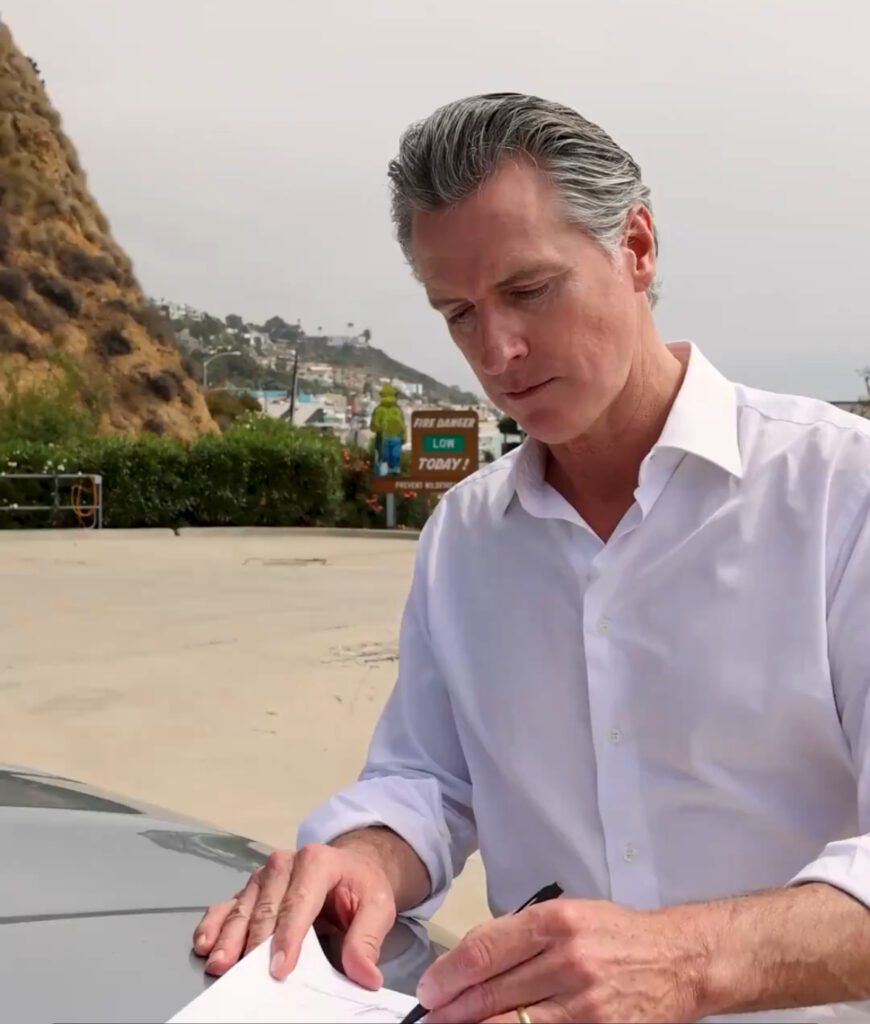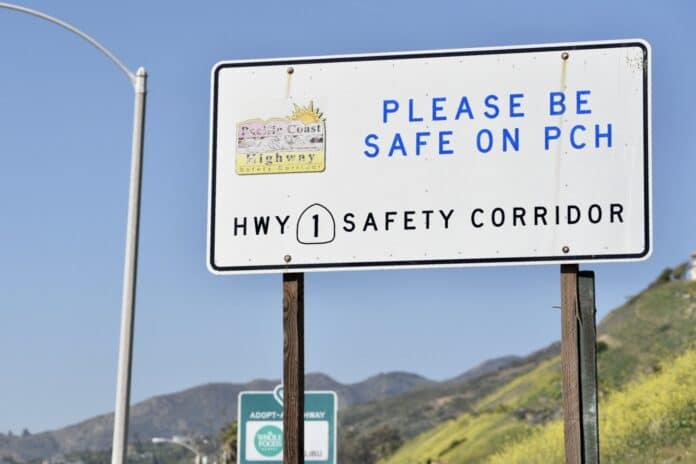Mayor Stewart Highlights New Safety Measure as a Critical Tool, but Emphasizes Ongoing Work to Ensure Successful Implementation
In a landmark step toward improving public safety along Malibu’s 21 miles of Pacific Coast Highway (PCH), Governor Gavin Newsom signed Senate Bill 1297 into law today, Friday, Sept. 27. The new legislation, authored by Senator Ben Allen (D-Malibu), authorizes the installation of speed cameras in Malibu to combat the persistent issue of excessive speeding on this notorious stretch of highway, which has been the site of numerous traffic accidents and fatalities.
The new law enables Malibu to install up to five automated speed enforcement cameras in high-risk areas, including school zones. These cameras will automatically detect vehicles exceeding the speed limit and issue fines, serving as a deterrent to reckless driving. The program will include speed feedback signs to alert drivers to their speed before issuing tickets. The bill also requires clear signage to notify drivers about the speed enforcement system and mandates a public education campaign before enforcement begins.
In a press release, Governor Newsom emphasized the critical need for these safety measures. “Over 60 lives lost on one stretch of our iconic Pacific Coast Highway is unacceptable — it’s a call to action. These new cameras will build on the state’s ongoing safety makeover that includes infrastructure upgrades, increased traffic enforcement, and a new public education campaign,” Newsom said.

Malibu Mayor Doug Stewart expressed his gratitude for the passage of SB 1297, describing it as a significant victory for public safety in Malibu. “We are incredibly thankful to Governor Newsom for signing this life-saving bill into law. SB 1297 is a major step in preventing further tragedies, and we are eager to implement these crucial safety measures along PCH,” Stewart said.
This legislation comes as part of a broader effort to improve road safety in Malibu and follows recent state support for infrastructure improvements along PCH. Earlier this year, $4.1 million was allocated for short-term infrastructure enhancements, as well as a comprehensive planning effort to reimagine the highway to accommodate all roadway users, including pedestrians and cyclists.
Governor Newsom’s signing of SB 1297 is particularly significant in light of his recent veto of Senate Bill 1509, the “NOT in California Act.” That bill, also introduced by Senator Allen, sought to impose stricter penalties for repeat speeding offenses on highways, including the PCH, as a further deterrent against reckless driving.
Malibu Mayor Doug Stewart expressed disappointment over the veto of SB 1509, highlighting the ongoing dangers posed by excessive speeding on PCH. “This bill was designed to address a critical issue impacting the safety of Malibu’s residents and visitors: excessive speeding on the Pacific Coast Highway,” Stewart said.
Since 2010, more than 60 people have lost their lives on this stretch of highway due to speeding, including four Pepperdine University students in a tragic accident just last year. Stewart stressed that despite increased enforcement measures, including a task force from the California Highway Patrol (CHP) dedicated to PCH enforcement, stricter penalties for repeat offenders are still necessary.
“We’ve seen a 36 percent reduction in injury collisions thanks to our combined efforts with the CHP and the Los Angeles County Sheriff’s Department (LASD), but enforcement alone is not enough. Stronger penalties for repeat offenders are critical to making our roads safer for everyone,” said Stewart.
Governor Newsom’s veto of SB 1509 was rooted in concerns over the fiscal and administrative impact of the proposed law, particularly its potential to interfere with the Department of Motor Vehicles’ (DMV) ongoing IT modernization efforts. Newsom also questioned the limited deterrent effect the bill would have, given its focus on increased penalties rather than proactive safety measures.
However, the governor has left the door open for further discussions on how best to address speeding on California’s highways, and Stewart remains hopeful that a solution can be found that balances fiscal responsibility with the urgent need for stronger safety measures.
“I urge the Legislature to work quickly to find an alternative that addresses the governor’s concerns while still delivering on the core intent of SB 1509: to protect people from the dangers of excessive speeding,” Stewart said.
As Malibu continues to deal with the dangers of speeding on PCH, SB 1297 represents a critical step forward in making the highway safer. The speed cameras authorized under this new law will act as a life-saving deterrent, especially in areas where high traffic volume and pedestrian activity make speeding particularly dangerous.
Senator Ben Allen, the author of SB 1297, called the signing of the bill a “huge win for the safety of Malibu residents and its visitors.” He added, “We know speed cameras can help curb reckless speeding — an issue this beautiful stretch of highway has been plagued with for years.”
Assemblymember Jacqui Irwin, who co-authored SB 1297 and represents Malibu, also praised the governor’s decision. “In addition to the $4.1 million already spent on safety improvements along the Pacific Coast Highway, SB 1297 is another piece of the puzzle to help save lives,” Irwin said.
Los Angeles County Supervisor Lindsey Horvath, who has been a strong advocate for road safety in Malibu, echoed these sentiments, noting that the passage of SB 1297 marks a critical milestone in the ongoing effort to protect lives along the PCH.
As part of the broader safety campaign, Malibu has been working closely with the CHP, LASD, and other state and local agencies to tackle the issue of speeding on PCH. The partnership with the CHP, which began in January 2024, has already produced significant results, including the 36 percent reduction in injury collisions mentioned by Stewart.
In addition to enforcement, Malibu has also benefited from public education efforts funded by the California Office of Traffic Safety, which recently awarded the city a $460,000 grant. These funds will support additional enforcement operations and community education initiatives aimed at promoting safe driving habits on PCH.
Looking ahead, Malibu will continue to pursue an “all of the above” approach to improving road safety. This includes infrastructure improvements, continued enforcement, public education, and now, the implementation of speed feedback signs and cameras under SB 1297.
With the new law set to go into effect in January 2025, Malibu will begin developing an implementation plan to deploy the speed cameras as quickly as possible while ensuring compliance with all regulatory requirements. The city remains committed to keeping the community informed throughout the process and working with state and local partners to make PCH a safer route for all who travel it.
“Ten months ago, this was impossible to imagine, and now we have this critical tool in our toolbox,” Stewart said. “However, the city’s work is far from over. We now have to ensure this becomes operational. City staff has been preparing for this moment, and there is more to come from them. This is a true example of it takes a village.”

